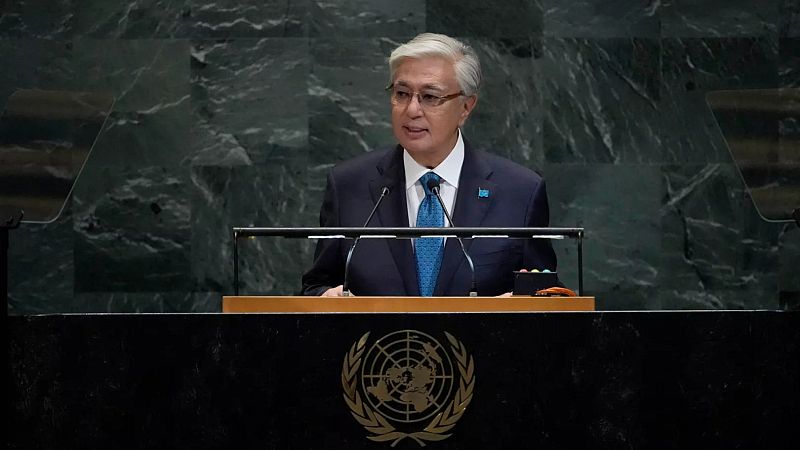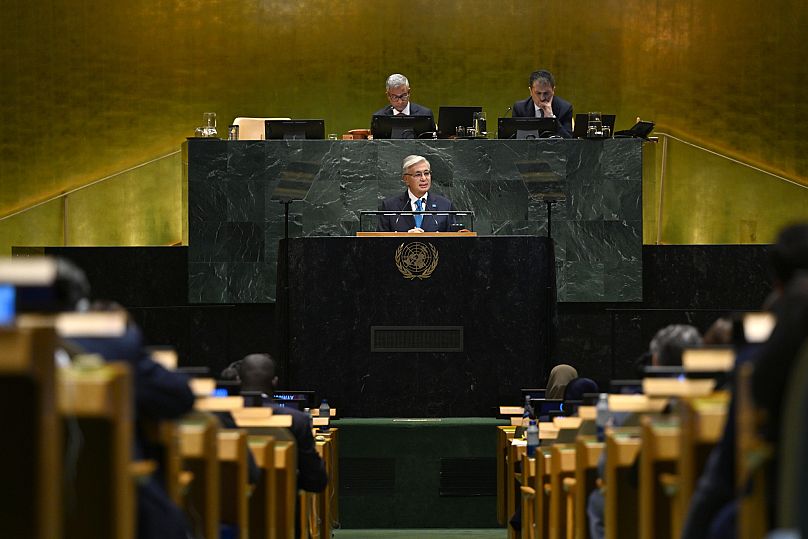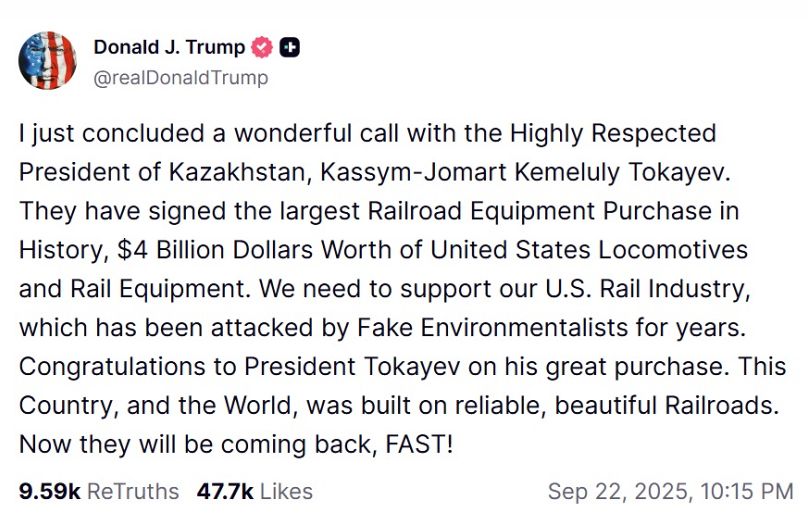Reform and a €3.5 billion deal: Kazakhstan's Tokayev at the UN General Assembly

Speaking at the 80th session of the United Nations General Assembly on Tuesday, Kazakhstan's President Kassym-Jomart Tokayev drew attention to the weakening credibility of global institutions.
"Serious violations of international law have become 'a new normality,' which undermines global stability and erodes confidence between peoples, between political leaders, and between states," he said.
He reaffirmed the need for a strong international governance in tumultuous times, for which the UN needs to adapt and reform.
"A central pillar of this bold effort to renew the UN should be a reform of the Security Council," Tokayev said, adding that Asia, Africa, and Latin America must be represented more fairly and that "middle powers" deserve a stronger role.
"Above all, a credible UN for the 21st century requires Member States to take concrete steps toward durable peace and security. Otherwise, the UN is doomed to forever mitigate consequences while root causes forever proliferate," Tokayev warned.
He also called for updating the UN Charter to reflect modern realities, pointing to the WWII-era "enemy state" clauses as outdated.
He expressed concern over conflicts in Ukraine and Gaza and the overall trend of increasing military spending, which last year hit a record €23 billion.
Divisions a matter of personal choice
"When political leaders make irresponsible statements or take reckless decisions, manipulating religion and identity for political gain, they in fact seriously damage the trust and goodwill in striving for peace," Tokayev stressed.
Kazakhstan's leader also emphasised his country's role as a hub for global investment, logistics and sustainable development, citing €340 billion in FDI, major transit projects and hosting the UN SDG Centre for Central Asia and Afghanistan.
He called for regional solidarity through the "Central Asia Plus" format and stressed support for inclusive development in Afghanistan.
"Kazakhstan believes that inclusive development in Afghanistan is a basis for long-term regional peace and stability," he noted.
Addressing climate change, he advocated for urgent cooperation to protect the Caspian Sea and strengthening water security, announcing a UN-backed ecological summit in April 2026.
The speech also highlighted AI as both an opportunity and a risk, with Kazakhstan aiming to become a digital leader, while continuing political reforms, sustaining strong economic growth, and advancing energy transition and agricultural exports.
$4 billion rail equipment deal
The biggest outcome of President Tokayev's trip to New York was inking an agreement with Wabtec for $4.2 billion (€3.5 billion). The document envisages production of 300 freight locomotives with improved characteristics in Kazakhstan and their servicing.
Following the deal, Donald Trump commended Kazakhstan on "the largest railroad equipment purchase in history" through his Truth Social account.
"I just concluded a wonderful call with the Highly Respected President of Kazakhstan, Kassym-Jomart Kemeluly Tokayev. They have signed the largest railroad equipment purchase in history, $4 billion dollars worth of United States locomotives and rail equipment," Trump wrote.
Tokayev also praised the deal, highlighting that it will support Kazakhstan's transport industry as well as the development of the Middle Corridor.
"We highly value Wabtec's key role in advancing our mechanical engineering and rail transport industries. In partnership with this company, Kazakhstan is building both physical networks and intelligent, integrated, data-driven transport corridors," said the Kazakh president at the round table with US businesses.
Wabtec has been present in Kazakhstan since 2009. Its locomotive plant in Astana has produced over 600 locomotives, invested €196 million, and achieved 45% localisation.
Overall, more than 630 US companies operate in Kazakhstan, including Chevron, ExxonMobil, Boeing, Visa, Mastercard, Meta, and Citibank.
Other deals, other meetings
Tokayev's trip to New York was productive, with the president holding over 20 high-level meetings with heads of state and CEOs of companies.
He met with President of the European Council António Costa, UN Secretary General Antonio Guterres, Ukrainian President Volodymyr Zelensky, President of Montenegro Jakov Milatović, Prime Minister of Luxemburg Luc Frieden, Prince of Monaco Albert II, President of France Emmanuel Macron, President of Finland Alexander Stubb, and Prime Minister of Belgium Bart De Wever.
He also presided over the signing of a distribution agreement between Amazon Kuiper and Kazakhtelecom, which gives the latter access to Kuiper satellite network. Under this agreement, Amazon Kuiper plans to deploy its own ground infrastructure in three Kazakh cities, investing approximately €170 million.
With PepsiCo Foundation Chairman, Stephen Kehoe, Tokayev discussed already launched construction of a snack production plant in the Almaty region, with an investment of $368 million.
The Smithsonian Institution will also launch Kazakhstan Cultural Heritage Fund, which will aid in the research, documentation and exhibition of Kazakhstan's cultural legacy.
Today



